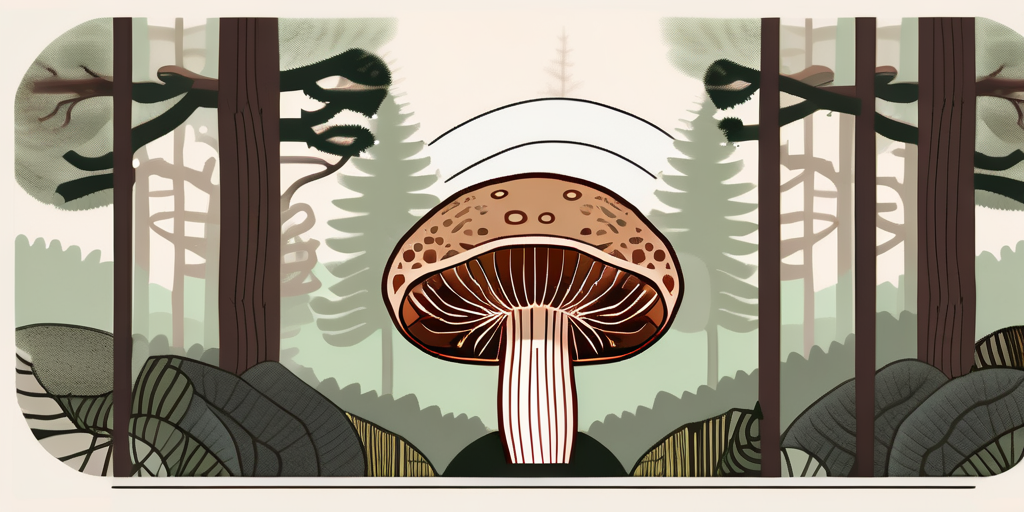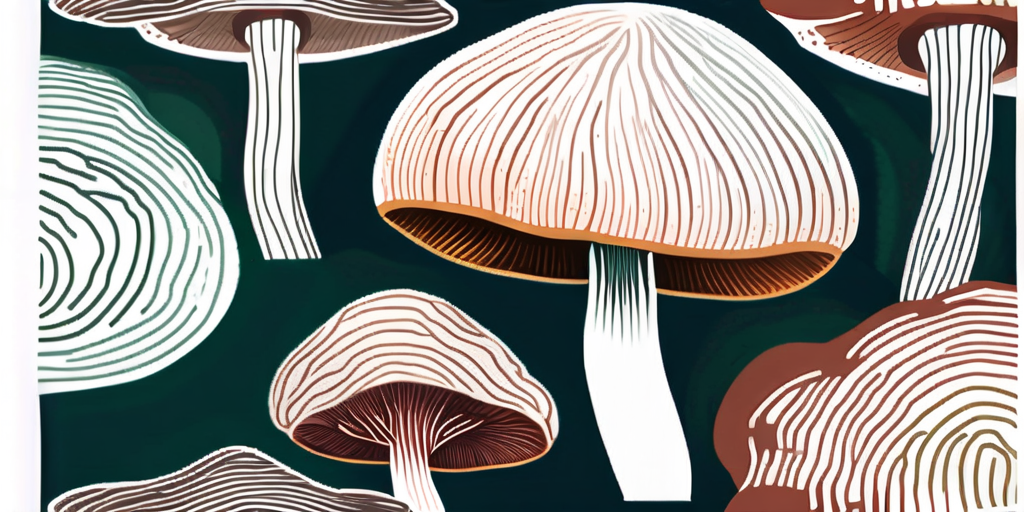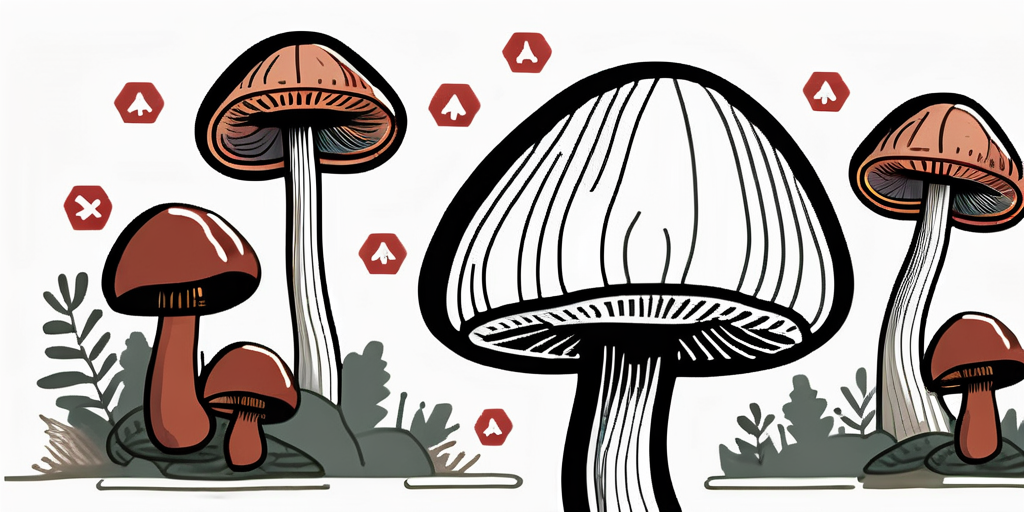Popular mushroom adaptogens: Reishi

Discover the powerful health benefits of Reishi, one of the most popular mushroom adaptogens.
Popular mushroom adaptogens: Reishi
In recent years, there has been a growing interest in the world of natural remedies and holistic approaches to health and wellness. One particular category of natural substances that has gained significant traction is adaptogens. These unique compounds have been used for centuries in various healing practices, and one of the most popular adaptogens today is Reishi mushroom. In this article, we will explore the basics of adaptogens, delve into the fascinating world of Reishi mushrooms, discuss their numerous health benefits, and offer ideas on how to incorporate them into your diet. However, as with any natural remedy, it's important to be aware of potential precautions and side effects. So, let's dive in and discover the wonders of Reishi mushroom!
Understanding the Basics of Adaptogens
Before we explore the specific benefits of Reishi mushroom, it's essential to understand what adaptogens are and how they work. Adaptogens are a class of herbs and substances that help the body adapt to stress, both physical and emotional. They work by supporting the body's ability to maintain balance and homeostasis, even under challenging circumstances.
Adaptogens achieve their stress-relieving properties through a variety of mechanisms within the body. One key way they function is by regulating the hypothalamic-pituitary-adrenal (HPA) axis, which plays a crucial role in the body's response to stress. By modulating this axis, adaptogens can help regulate the release of stress hormones like cortisol, thereby reducing the negative impact of chronic stress on the body.
What are Adaptogens?
Adaptogens can be thought of as natural stress relievers. They help the body normalize its response to stressors, allowing it to better cope with the demands of modern life. Unlike other substances that may temporarily boost energy or calm the nervous system, adaptogens work by regulating the body's stress response over the long term.
Furthermore, adaptogens are unique in their ability to exert a non-specific response, meaning they can support the body in facing a wide range of stressors, whether physical, chemical, or biological. This broad-spectrum action sets adaptogens apart from other herbs and supplements that may have more targeted effects on specific systems within the body.
The Role of Adaptogens in Health and Wellness
Adaptogens have been used in traditional medicine systems, such as Ayurveda and Traditional Chinese Medicine, for centuries. They are believed to bring balance to the body, enhance vitality, and promote overall well-being. With the rise of modern research, adaptogens have begun to gain recognition in Western medicine as well, with studies exploring their potential therapeutic effects.
Research into adaptogens has also uncovered their antioxidant properties, which play a crucial role in protecting cells from damage caused by free radicals. By scavenging these harmful molecules, adaptogens help reduce oxidative stress in the body, which is linked to a variety of chronic diseases and aging processes. This antioxidant activity further contributes to the overall health-promoting effects of adaptogens, making them valuable allies in maintaining wellness and resilience.
The Power of Reishi Mushroom
Among the vast array of adaptogens, Reishi mushroom stands out as one of the most revered and well-studied. Reishi, scientifically known as Ganoderma lucidum, has a rich history and is deeply rooted in Eastern healing traditions.

Reishi mushroom is not only esteemed for its medicinal properties but also for its unique appearance. This fungus grows on the stumps of deciduous trees and has a shiny, reddish-brown cap with a woody texture. Its distinctive appearance has made it a subject of fascination and admiration in various cultures.
The History and Origin of Reishi Mushroom
Reishi mushroom has been used in Traditional Chinese Medicine for over two thousand years. It was highly regarded by ancient emperors and was often referred to as the "mushroom of immortality" or the "elixir of life." It was believed to promote longevity, enhance spiritual well-being, and restore balance to the body.
Legend has it that the discovery of Reishi mushroom was serendipitous, with ancient herbalists stumbling upon it while foraging in the deep forests of Asia. Its association with longevity and vitality quickly elevated its status in traditional medicine, leading to its widespread use in various formulations and remedies.
Nutritional Profile of Reishi Mushroom
Reishi is a powerhouse of nutrients and bioactive compounds. It contains a variety of vitamins, minerals, amino acids, polysaccharides, and triterpenes. These compounds are thought to be responsible for its numerous health benefits.
Furthermore, Reishi mushroom is known for its adaptogenic properties, which means it helps the body adapt to stress and maintain balance. This adaptability is attributed to the presence of beta-glucans in Reishi, which modulate the immune system and support overall well-being. The synergistic combination of nutrients and bioactive compounds in Reishi makes it a valuable addition to any wellness routine.
Health Benefits of Reishi Mushroom
Reishi mushroom is celebrated for its plethora of health benefits. Let's explore some of the most notable ones:

Reishi mushroom, scientifically known as Ganoderma lucidum, has been used for centuries in traditional Chinese medicine for its various health-promoting properties. It is often referred to as the "mushroom of immortality" due to its potential to promote longevity and overall well-being.
Immune System Support
One of the primary benefits of Reishi mushroom is its ability to strengthen the immune system. It contains compounds such as beta-glucans and polysaccharides that support the production and activity of white blood cells, which are essential for fighting off pathogens and keeping the immune system robust. Additionally, Reishi has been shown to have anti-inflammatory effects, further supporting immune function.
Stress and Anxiety Relief
In our fast-paced modern world, stress and anxiety have become all too common. Reishi mushroom may offer some relief in that regard. Studies have shown that Reishi has adaptogenic properties, helping the body better respond to stress by regulating the release of stress hormones like cortisol. This regulation can promote a sense of calm and relaxation, potentially reducing symptoms of anxiety and improving overall mental well-being.
Potential Anti-Cancer Properties
Research has also explored the potential anti-cancer properties of Reishi mushroom. Preliminary studies suggest that certain compounds found in Reishi, such as triterpenes and polysaccharides, may inhibit the growth and spread of cancer cells by inducing apoptosis (cell death) and inhibiting angiogenesis (the formation of new blood vessels to support tumor growth). While more research is needed in this area, these findings are promising and highlight the potential of Reishi as a complementary therapy for cancer patients.
Incorporating Reishi Mushroom into Your Diet
Traditionally, Reishi mushroom was used in the form of a tea or decoction. However, with the modern popularity of this adaptogen, there are now various ways to incorporate it into your everyday life:
Reishi mushrooms, also known as Lingzhi mushrooms, have a long history of use in traditional Chinese medicine. They are revered for their potential health benefits, including immune system support and stress reduction. In addition to being consumed as a tea, Reishi can also be found in tinctures, extracts, and even as an ingredient in skincare products.
Reishi Mushroom in Traditional Medicine
In traditional medicine practices, Reishi is often brewed as a medicinal tea. To prepare the tea, simply simmer dried Reishi slices in water for about 1-2 hours. This method allows for the extraction of the mushroom's beneficial compounds, resulting in a potent herbal concoction.
Many traditional healers believe that the slow brewing process is essential for unlocking the full spectrum of Reishi's healing properties. The resulting tea is earthy and slightly bitter, a testament to the mushroom's potency and concentration of bioactive compounds.
Modern Uses and Recipes for Reishi Mushroom
For those looking for more creative ways to enjoy Reishi, there are now Reishi powders and capsules available in health food stores. These can be easily added to smoothies, soups, or even homemade chocolate truffles for an added boost of nutrition.
Reishi mushroom powder is a convenient option for busy individuals who want to incorporate this superfood into their daily routine. It can be sprinkled over oatmeal, blended into lattes, or mixed into energy balls for a quick and nutritious snack. The versatility of Reishi powder makes it a popular choice for health-conscious consumers seeking to harness the benefits of this ancient mushroom.
Precautions and Potential Side Effects
While Reishi mushroom is generally considered safe for most individuals, there are a few precautions to keep in mind:

Who Should Avoid Reishi Mushroom?
Reishi mushroom is generally safe for the majority of people. However, individuals with certain conditions, such as low blood pressure or bleeding disorders, should exercise caution. Additionally, pregnant or breastfeeding women should consult their healthcare provider before using Reishi supplements.
Possible Interactions and Contraindications
Reishi mushroom may interact with certain medications, including anticoagulants and immunosuppressants. If you are taking any prescription or over-the-counter medications, it's crucial to speak with your healthcare provider before incorporating Reishi into your routine.
In conclusion, Reishi mushroom is a fascinating adaptogen with a long history of use in traditional medicine. From its immune-boosting properties to its potential as an anti-cancer agent, Reishi offers a multitude of health benefits. Whether you choose to enjoy it as a comforting tea or add it to your favorite recipes, this mushroom can help support your overall well-being. Remember, as with any natural remedy, it's important to practice moderation and consult with a healthcare professional before starting any new supplements. Here's to embracing the power of Reishi mushroom in our journey towards optimal health!











